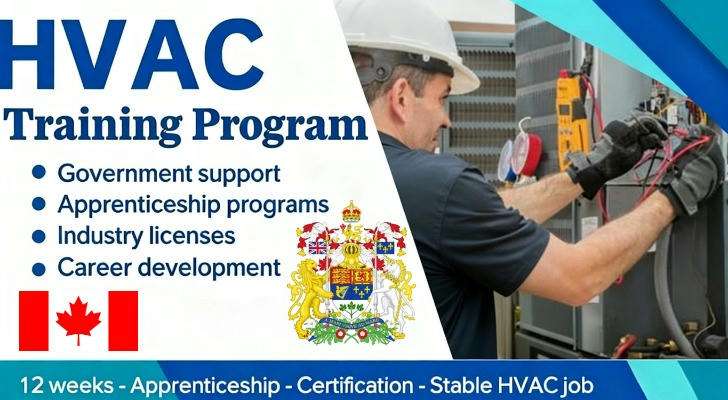🔥 Master Core HVAC Skills Through a Focused 12-Week Training Course
Beginning a career as an HVAC technician can be daunting due to factors like the cost of training, uncertainties about earning potential, and the complexities of apprenticeship programs. These challenges often leave aspiring technicians unsure about how to proceed effectively.
This article offers clear guidance based on up-to-date industry data to help newcomers navigate:
Selecting impactful training programs
Achieving essential certifications
Utilizing government support to establish a rewarding and stable career

📌 HVAC Technician Career Outlook and Core Skills
HVAC technicians are indispensable for installing, servicing, and repairing heating, ventilation, and air conditioning systems across residential, commercial, and industrial settings. Their expertise ensures optimal indoor comfort and air quality.
Core Skills Include:
Strong problem-solving abilities
Knowledge of thermodynamics
Proficiency in electrical systems
Understanding refrigeration principles
Career Outlook:
Increasing demand driven by retiring workforce and emphasis on energy-efficient systems
Opportunities for career advancement in project management, sales, and system design
Exposure to diverse sectors including residential, commercial, and industrial environments
📚 Recommended High-Quality HVAC Training Programs
Solid training forms the foundation of a successful HVAC career. Notable programs include:
| Program | Duration | Features | Focus Areas |
|---|---|---|---|
| Skilled Trades College of Canada | 12 weeks | 80% hands-on learning, small class sizes | Installation, maintenance, repair basics, safety protocols |
| HRAI (Heating, Refrigeration and Air Conditioning Institute) | Varies | Specialized training, accredited certifications | Ventilation systems, air system design, heat loss analysis |
These programs emphasize practical experience and safety, preparing students for real-world HVAC challenges and enhancing employability.
🔍 Mastering Certification and Apprenticeship Pathways
The path to becoming a licensed HVAC technician in Canada typically involves:
- Education: Completion of high school or equivalent with focus on math, physics, and chemistry
- Pre-Apprenticeship Training: Foundational HVAC knowledge covering system installation, maintenance, and repair
- Apprenticeship: Hands-on work experience combined with classroom learning
- Certifications:
- 313A Refrigeration and Air Conditioning Systems Mechanic (commercial/industrial)
- 313D Residential Air Conditioning Systems Mechanic
- Gas Technician Levels G1, G2, G3 for gas appliances
- 313A Refrigeration and Air Conditioning Systems Mechanic (commercial/industrial)
- Advanced Credentials: Red Seal certification allowing work mobility across Canada
- Licensing: Successful completion of apprenticeship and passing of qualifying exams
📊 Salary Levels and Job Stability
HVAC technicians in Canada earn competitive wages, with salaries varying based on several factors. Entry-level technicians typically start at around $21 per hour, while experienced professionals can earn up to $36 per hour or more.
A summary of Canadian HVAC technician salaries:
| Percentile | Annual Salary | Monthly Pay | Weekly Pay | Hourly Wage |
|---|---|---|---|---|
| Senior | $75,000 | $6,250 | $1,442 | $36 |
| Advanced | $63,000 | $5,250 | $1,211 | $30 |
| Intermediate | $50,196 | $4,183 | $965 | $24 |
| Entry-Level | $44,000 | $3,666 | $846 | $21 |
Benefits of the Profession:
✅ Job security due to labor shortages and essential services
✅ Opportunities for advancement into supervisory or specialized roles
✅ Competitive wages with possibilities for overtime
🎯 Government Support and Funding Policies
Several government initiatives support HVAC training and career development by alleviating financial burdens:
| Program | Benefits | Availability |
|---|---|---|
| Canada Job Grant Fund | Partial reimbursement of training fees | Nationwide |
| Provincial Apprenticeship Programs | Structured training with financial incentives | Varies by province |
💡 These supports reduce financial burdens and encourage skill development, easing entry into the HVAC workforce.
✅ Summary
By integrating:
Focused and practical training programs
Comprehensive certificatio
Available government funding and support
Aspiring HVAC technicians can embark onclear, affordable, and achievable career journey. With these resources, entering the HVAC trade becomes more accessible, ensuring a stable and prosperous future in this vital industry.
